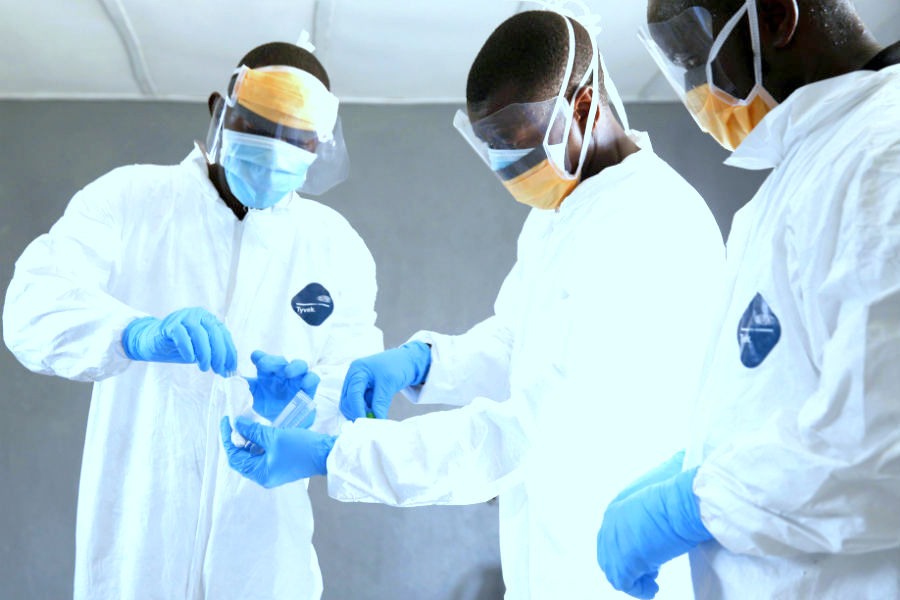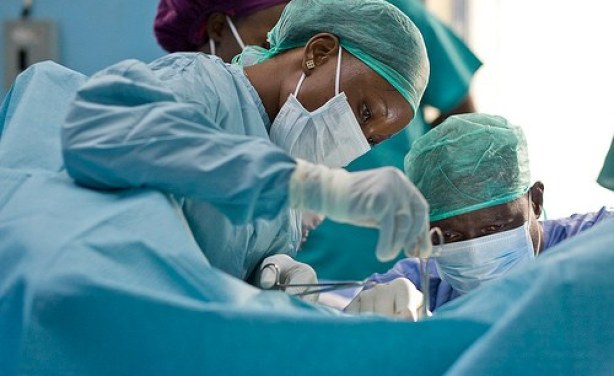Like his predecessor, President Bola Tinubu has failed to honour Nigeria’s commitment to the African Union (AU) to allocate at least 15 per cent of the country’s annual budget to the health sector.
The commitment, which was made by heads of African countries in 2001 and is now known as the ‘Abuja Declaration’, is a collective effort to promote increased funding for the health sector in the region.
However, about 22 years after this commitment was made, many countries, including Nigeria, have not found the way or the will to meet this target.
A review of the budgetary allocation to the health sector in the last 22 years revealed that Nigeria has consistently fallen below the 15 per cent benchmark.
There was high optimism that Mr Tinubu would break this pattern and allocate more substantial funds to the health sector in his first full-year budget. However, the 2024 budget allocated just a little over five per cent to the health sector, dashing hopes for a significant stride toward meeting the AU commitment.
2024 Budget
A review of the 2024 proposed budget indicates that only about five per cent of the total budget is allocated to the health sector.
Of the total N27.5 trillion proposed budget for 2024, tagged ‘Budget of Renewed Hope’, the health sector which is already grappling with various challenges got N1.38 trillion (5.03 per cent).
This includes healthcare funding under the service vote amounting to N155.65 billion, health capital budget at N434.79 billion, health recurrent at N667.38 billion, and statutory transfer to the basic healthcare fund at N125.74 billion.

Although the 2024 budget proposal does not meet the Abuja Declaration, it is 18.49 per cent higher than the N1.17 trillion budgeted for 2023.
Sectors with higher allocations
Although the budgetary allocation to health does not meet the Abuja Declaration, it is one of the highest sectoral allocations in the budget, only bettered by defence and security (11.8 per cent) and education (7.9 per cent).
The higher allocation to those two sectors may be explained by happenings in the country. Nigeria faces multiple internal security problems with various armed groups operating in different parts of the country. Experts have called for increased manpower, better equipment and better funding as ways of tackling the security challenges.
Also, the education sector has witnessed strikes by many workers unions such as ASUU and SSANU mainly due to the underfunding of the sector.
Meeting Abuja Declaration
Analysing the budget, the Development Research and Projects Centre (dRPC) in its latest report observed that the current N1.38 trillion healthcare budget proposal would require an additional N2.75 trillion to meet the 15 per cent AU’s commitment.

It said to put this in perspective, over the last decade of signing the Abuja Declaration, Nigeria’s total budget would amount to N131.88 trillion, out of which only N6.39 trillion has been allocated to healthcare in that time, leaving a cumulative funding gap of N13.39 trillion in ten years for health.
It said the share of healthcare allocation in ten years is only 4.85 per cent, which is well below the promised 15 per cent commitment.
A pattern
Former Nigerian President Muhammadu Buhari also failed to meet the 15 per cent benchmark throughout his eight years in office.
Despite a historic milestone in the 2023 budget, where the health sector received a trillion Naira for the first time in Nigeria’s health funding history, it still failed to align with the commitment outlined in the Abuja Declaration.
Comparatively, the 2023 budget reflects a significant increase from the N826.9 billion allocated to the health sector in 2022 and the N547 billion allocated in 2021. While the capital expenditure witnessed a robust 94.83 per cent increase from the 2022 budget, the recurrent health expenditure also saw a rise of 25.54 per cent.
From 2015 to the proposed 2023 budget, the health budget witnessed a substantial increase, soaring from N278.31 billion to N1.17 trillion. Similarly, health recurrent budget figures climbed from N237.31 billion in 2015 to N580.82 billion in 2023, with health capital expenditure increased from N22.68 billion in 2015 to N404.08 billion in 2023.
Despite these, none came close to meeting the targeted 15 per cent commitment.
A case for improved funding
Nigeria, Africa’s most populous nation, is grappling with various challenges in its healthcare sector. These problems include inadequate infrastructure, a shortage of skilled health workers, low government spending, high out-of-pocket expenditure, and unequal access to quality healthcare.

Nigeria’s health indicators, such as life expectancy, immunisation coverage, and maternal and infant health, are still behind those of many other countries despite some improvements in recent years.
Nigeria’s health system has been rated as one of the worst globally for several years. In 2017, the World Health Organisation’s analysis of health systems ranked Nigeria 187 out of 191, better only than the Democratic Republic of the Congo, the Central African Republic, and Myanmar.
The same survey carried out in 2021 ranked Nigeria’s healthcare system as the fourth worst in the world.
The 2013 National Demographic and Health Survey (NDHS) shows that infant and under-five mortality rates were 69 and 128 deaths per 1,000 live births, respectively. But, in 2018, the infant mortality rate reduced to 67 deaths per 1,000 live births, while under-five mortality rose to 132 deaths per 1,000 live births.
A WHO report put the maternal mortality rate in Nigeria as 814, per 100,000 live births only outperforming Chad with 856, the Central African Republic; with 882, and Sierra Leone; with 1,360.
Statistics also show that for every 1,000 births in Nigeria, 108 infants and children die before the age of five.
Also, the 2021 World Malaria Report indicates that Nigeria had the highest number of global malaria cases (27 per cent of global malaria cases) and the highest number of deaths (32 per cent of global malaria deaths) in 2020. The country also accounted for an estimated 55.2 per cent of malaria cases in West Africa in 2020.
The case numbers increased by 5.3 per cent between 2017 and 2020, from 298 to 314 per 1,000 of the population at risk. Deaths increased by 4.7 per cent, from 0.92 to 0.97 per 1,000 of the population at risk during that same period.
The 2022 World Malaria Report also shows that Nigeria recorded 31 per cent of the 619,000 deaths recorded globally in 2021.
Amidst this, most of the healthcare spending (75 per cent) is out-of-pocket, leaving most Nigerians without health insurance and facing high financial barriers to accessing quality healthcare.
Despite an annual population growth rate of 2.6 per cent, there has been no corresponding increase in health infrastructure and workforce, leading to a significant brain drain, with many health workers leaving the country. The primary reasons for emigration are poor remuneration, rising insecurity, and inadequate diagnostic facilities.

The Nigerian Medical Association (NMA) on Monday said unless the ongoing trend of medical and dental practitioners leaving the country is promptly reversed, Nigeria is on the verge of a significant crisis in the health sector.
The medical association said for the country to halt the brain drain, governments at all levels must as a matter of urgency provide a better working environment for the practice of medicine/dentistry, and pay better and more competitive remuneration.
It said the government must also show “better political commitment to health and prioritise healthcare provision in their scales of preference, provide robust access to social amenities and upgrade decaying utilities, rejig national security architecture for the safety of all citizens, and provide increased gainful employment opportunities for doctors.”
Highlighting the implications of the existing funding gap on Nigeria’s healthcare system, the dRPC noted that inadequate financial resources may hinder the implementation of comprehensive health programmes and services.

Way Forward
According to the dRPC, the proposed 2024 health budget shows progress, but there are still challenges to be addressed, as the total budget size for health is inadequate to meet the needs of the country.
It said the increase in the health budget by 18.49 per cent compared to the rising inflation and 75 per cent increase in the exchange rate may pose challenges for Nigeria, which heavily relies on imports.
To address these issues and ensure better health outcomes for all Nigerians, the organisation said allocation for health needs should be increased to at least 15 per cent of the total budget, as stated by the Abuja Declaration of 2001.
“This will not only help achieve Universal Health Coverage (UHC) by 2030 and meet the health-related Sustainable Development Goals (SDGs) but also enable the country to deal with emerging epidemics and pandemics.”
According to dRPC, stakeholders need to collaborate to engage the Nigerian government to understand the impact of the reduction and shortfall on critical health projects and services.
It also suggested reducing the debt service burden, which consumes 31 per cent of the total budget and the reallocation of the savings to the health sector.
Support PREMIUM TIMES’ journalism of integrity and credibility
Good journalism costs a lot of money. Yet only good journalism can ensure the possibility of a good society, an accountable democracy, and a transparent government.
For continued free access to the best investigative journalism in the country we ask you to consider making a modest support to this noble endeavour.
By contributing to PREMIUM TIMES, you are helping to sustain a journalism of relevance and ensuring it remains free and available to all.
TEXT AD: Call Willie – +2348098788999










